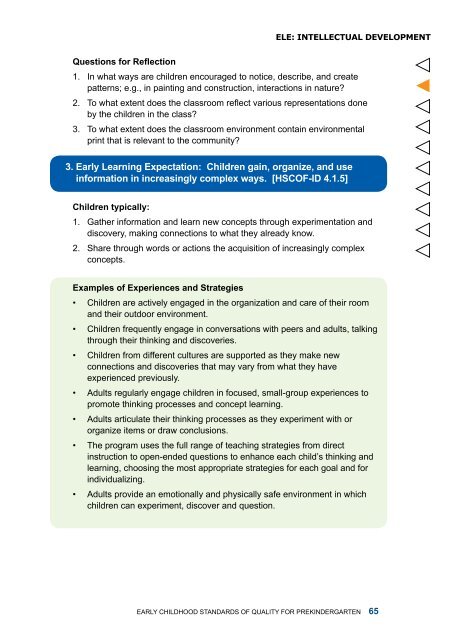Early Childhood Standards of Quality for ... - State of Michigan
Early Childhood Standards of Quality for ... - State of Michigan
Early Childhood Standards of Quality for ... - State of Michigan
Create successful ePaper yourself
Turn your PDF publications into a flip-book with our unique Google optimized e-Paper software.
ELE: Intellectual DevelopmentQuestions <strong>for</strong> Reflection1. In what ways are children encouraged to notice, describe, and createpatterns; e.g., in painting and construction, interactions in nature?2. To what extent does the classroom reflect various representations doneby the children in the class?3. To what extent does the classroom environment contain environmentalprint that is relevant to the community?3. <strong>Early</strong> Learning Expectation: Children gain, organize, and usein<strong>for</strong>mation in increasingly complex ways. [HSCOF-ID 4.1.5]Children typically:1. Gather in<strong>for</strong>mation and learn new concepts through experimentation anddiscovery, making connections to what they already know.2. Share through words or actions the acquisition <strong>of</strong> increasingly complexconcepts.Examples <strong>of</strong> Experiences and Strategies• Children are actively engaged in the organization and care <strong>of</strong> their roomand their outdoor environment.• Children frequently engage in conversations with peers and adults, talkingthrough their thinking and discoveries.• Children from different cultures are supported as they make newconnections and discoveries that may vary from what they haveexperienced previously.• Adults regularly engage children in focused, small-group experiences topromote thinking processes and concept learning.• Adults articulate their thinking processes as they experiment with ororganize items or draw conclusions.• The program uses the full range <strong>of</strong> teaching strategies from directinstruction to open-ended questions to enhance each child’s thinking andlearning, choosing the most appropriate strategies <strong>for</strong> each goal and <strong>for</strong>individualizing.• Adults provide an emotionally and physically safe environment in whichchildren can experiment, discover and question.<strong>Early</strong> <strong>Childhood</strong> <strong>Standards</strong> <strong>of</strong> <strong>Quality</strong> <strong>for</strong> Prekindergarten 65


